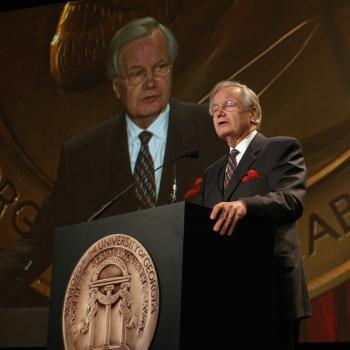
“Our Father, which art in Heaven, hallowed would be thy name….” So begins the greatest prayer in Christendom.
Different Protestant traditions view the Lord’s prayer in different ways. Some feel it’s too “Catholic” and rarely say it in church. Others routinely pray it during Sunday School and morning services, as my church does.
Patheos contributor Keith Giles, a former pastor, says in his post “Uncovering Hidden Secrets of the Lord’s Prayer” that “Christians have a unique problem. We know some verses of scripture so well that we can’t see clearly what it really says.
“… repeating the words from memory isn’t the same as understanding what is being said. The familiarity we have with the passage can actually become a barrier that prevents us from really seeing and receiving the truth that Jesus wants us to practice,” he explains.
And that’s the direction I’m heading with this post. Repetition can be a good thing, but it also may be problematic if the words lose their meaning. So, let’s take a fresh look at the Lord’s prayer and ask ourselves how it might bring greater meaning to your life and mine. You might also read Keith Giles’s post here.
Our Father, Which Art in Heaven
Jesus first prayed the Lord’s prayer, as recorded in Matthew and Luke, when his disciples asked him how to pray. They may have sensed that their prayers were different from Christ’s, and they wanted to learn and grow.
In sharing the Lord’s pray with his disciples, Christ brought together everything we need to know about prayer into a few simple words. Those words are so uncomplicated that a child can remember them and so meaningful that we can feel God’s presence if we let ourselves.
Many Protestants pray the prayer as it appears in Matthew 6:9-11:
“Our Father, which art in heaven, Hallowed be thy name. Thy kingdom come. Thy will be done in earth as it is in heaven. Give us this day our daily bread. And forgive us our trespasses, as we forgive those who trespass against us. And lead us not into temptation, but deliver us from evil: For thine is the kingdom, and the power, and the glory, forever. Amen.”
Different Faith Traditions, Different Versions
There are several versions of the Lord’s prayer within the Protestant faith, Catholicism and the Eastern Orthodox Church, and each version has its own beauty and power. The Catholic and Orthodox Lord’s prayers are very similar to the Protestant version, though they don’t include these words: “For thine is the Kingdom, and the power, and the glory forever.”
You can learn more about Catholic teachings on the Lord’s prayer here. For more information from the Orthodox Church, click here.
Translation or Version?
The Bible was originally written in Hebrew, Greek and Aramaic, which was the language Jesus spoke. It has been translated into 704 languages, while the New Testament is available in more than 1,500, per Biblica, a global Bible ministry.
The best translations are faithful to the original text, which is the reason I prefer them over versions. Versions may be different editions or revisions of a translation, but they don’t come directly from the original.
The New Living Translation (NLT) is my preference because it uses contemporary English, which I find easier to understand than the beautiful, but archaic language of King James. Consequently, I use the NLT most times and turn to King James for certain Bible verses such as the Lord’s prayer and the Nativity.
Comparing Matthew & Luke
Matthew 6:9-11 records the prayer as Christ prayed it during the Sermon on the Mount. Christ “introduces it as a better way or as the right way to pray in contrast to the way hypocrites and pagans pray,” says the Studying Prayer website, whose roots are in the evangelical tradition.
Christ tells his disciples this in Matthew: “And when you pray, you shall not be like the hypocrites. For they love to pray standing in the synagogues and on the corners of the streets, that they may be seen by men (v. 3)…And when you pray, do not use vain repetitions as the heathen do. For they think that they will be heard for their many words (v. 7)…In this manner, therefore pray: ‘Our Father, which art in heaven…’”
Luke’s account, on the other hand, takes place during a journey from Galilee to Jerusalem and is shorter than Matthew’s version.
Luke 11:1-4 says: “And it came to pass, that, as he (Christ) was praying in a certain place, when he ceased, one of his disciples said unto him, Lord, teach us to pray, as John also taught his disciples.
“And he (Christ) said unto them, ‘When ye pray, say, Our Father, which art in heaven, Hallowed be thy name. Thy kingdom come. Thy will be done, as in heaven so in earth. Give us day by day our daily bread. And forgive us our sins; for we also forgive every one that is indebted to us. And lead us not into temptation; but deliver us from evil.”
The ending seems rather abrupt, but then, I have prayed Matthew’s version for most of my life and am used to ending with “For thine is the kingdom….”
A New Intimacy with God
The Lord’s prayer begins with two words that were revolutionary for their time, “Our Father.”
“There was no such prayer before this teaching of Christ,” the Orthodox Church notes. “The Old Testament people did not address God as ‘Abba: Father’ (Rom. 8:15, Gal. 4.6).” They typically called God “Yahweh,” “Lord” or “God” rather than the more intimate “Father.”
In the New Testament, however, Jesus frequently addresses God as “Father,” and he teaches us in the Lord’s prayer to do the same. This level of intimacy with God may have surprised or even shocked the disciples.
“Jesus may have understood Abba to be the new name of God that corresponds to the new beginning, the new exodus, the new covenant with his people that God is initiating,” says Richard Bauckham in his book Jesus: A Very Short Introduction. Bauckham is a biblical scholar in New Testament studies.
“Just as God gives Israel a distinct name for himself in the exodus (Exodus 3:14-15), so now God receives another name in the second exodus,” he says.
Our Father, Which Art in Heaven
“Our Father, which art in heaven” is how Christ teaches us to begin the Lord’s prayer. In saying these words, we are acknowledging God as our divine father and joining with Christians around the world under the one umbrella of our Father.
The word Father means different things to different people. When I say Father, I think of my earthly father and am filled with warmth and love. He was the one man in my life who always loved me and didn’t let me down in some major way. I miss him terribly despite the fact that he died quite a few years ago.
But my heart goes out to people whose earthly fathers don’t or didn’t fill their children’s lives with love and affection. May their wounds heal with God’s help.
Hallowed Be Thy Name
God’s name is holy, sanctified or blessed. “There is no one holy like the Lord,” says 1 Samuel 2:2. When we say, “Hallowed be Thy name,” we are acknowledging and revering God’s name.
Thy Kingdom Come
This is the spiritual realm or the fulfillment of God’s will on earth. It is “characterized by faith, hope, and love,” according to 1 Corinthians 13:13. As Christians, we look forward to the return of Christ and the fulfillment of his promise to us.
Thy Will Be Done on Earth….
“Thy will be done” is one of the most important statements in the Bible. When we pray “thy will be done,” we are acknowledging that God knows more than we do, and we are turning our lives and problems over to him.
If you have ever prayed those words, you know how difficult it is to follow through. I have turned one family member over to God on numerous occasions, only to take her back. Yet, I know God can do much more for her than I can because I see his presence in her life.
Give Us This Day Our Daily Bread
We need food to sustain our bodies and keep us going, but we also need the nourishment that God provides our souls.
Forgive Us Our Trespasses….
Every person on earth needs God’s forgiveness because every one of us has sinned in some way. When we ask God to forgive us, we must clear the slate in our own lives by forgiving others who have wronged us.
Genuine forgiveness isn’t easy, and the Bible urges us to pray for God’s help, according to Christianity Today. Forgiveness may take time, but it’s a freeing experience when you allow it to happen.
And Lead Us Not into Temptation….
“Lead us not into temptation” doesn’t mean that God tempts us. Far from it. The Orthodox church explains that these words are a petition to God to shelter us from sin.
“It is a prayer that we be kept from those people and places where wickedness reigns and where we in our weakness will certainly succumb. It is a prayer that we will be liberated from the deceit and vanity of our minds and hearts,” the church says.
For Thine Is the Kingdom….
Many Protestants close the Lord’s prayer with these words: “For thine is the kingdom, and the power, and the glory, forever. Amen.” We acknowledge in this statement or doxology that Christ is in charge. He is the King of Kings and Lord of us all (see Phil. 2:9-11).
Final Thoughts
When I’m alone, I find it best to bow my head and pray the Lord’s prayer slowly. It isn’t for God’s benefit that I pray this way. It’s for mine. I also may stop in mid-prayer to let my soul absorb the words. Praying the Lord’s prayer in that way brings me peace, and my heart fills with God’s love.
May the Lord’s prayer bring you peace as well.
Amen.













